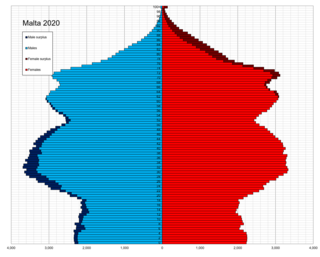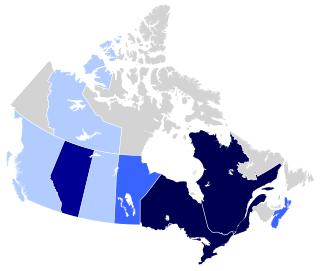Related Research Articles

Ghana, officially the Republic of Ghana, is a country in West Africa. It abuts the Gulf of Guinea and the Atlantic Ocean to the south, sharing borders with Ivory Coast in the west, Burkina Faso in the north, and Togo in the east. Ghana covers an area of 238,535 km2 (92,099 sq mi), spanning diverse biomes that range from coastal savannas to tropical rainforests. With over 32 million inhabitants, Ghana is the second-most populous country in West Africa, after Nigeria. The capital and largest city is Accra; other major cities are Kumasi, Tamale, and Sekondi-Takoradi.

This article is about the demographic features of the population of Malta, including population density, ethnicity, religious affiliations and other aspects of the population.

Highlife is a music genre that started in present-day Ghana in the 19th century, during its history as a colony of the British Empire and through its trade routes in coastal areas. It describes multiple local fusions of African metre and western jazz melodies. It uses the melodic and main rhythmic structures of traditional Akan music, Kpanlogo Music of the Ga people, but is typically played with Western instruments. Highlife is characterized by jazzy horns and multiple guitars which lead the band and its use of the two-finger plucking guitar style that is typical of African music. Recently it has acquired an uptempo, synth-driven sound.

African socialism or Afrosocialism is a belief in sharing economic resources in a traditional African way, as distinct from classical socialism. Many African politicians of the 1950s and 1960s professed their support for African socialism, although definitions and interpretations of this term varied considerably. These politicians include Julius Nyerere of Tanzania, Kwame Nkrumah of Ghana, and Modibo Keita of Mali, among others.

Black Canadians, also known as Afro-Canadians, are people of full or partial sub-Saharan African descent who are citizens or permanent residents of Canada. The majority of Black Canadians are of Caribbean and African immigrant origin, though the Black Canadian population also consists of African American immigrants and their descendants. Black Canadian migration from Africa has risen substantially since 2011.
A model minority is a minority demographic whose members are perceived as achieving a higher degree of socioeconomic success than the population average, thus serving as a reference group to outgroups. This success is typically measured relatively by educational attainment; representation in managerial and professional occupations; and household income, along with other socioeconomic indicators such as low criminality and high family/marital stability. The concept of model minority is associated with Asian Americans in the U.S. Many European countries have concepts of classism that stereotype ethnic groups in a similar manner.

Islam was the first Abrahamic monotheistic religion to arrive in Ghana. Today, it is the second most widely professed religion in the country behind Christianity. Its presence in Ghana dates back to the 10th century. According to the Ghana Statistical Service's Population and Housing census (2021), the percentage of Muslims in Ghana is about 19.9%.
Hiplife is a Ghanaian musical style that fuses Ghanaian culture and hip hop. Recorded predominantly in the Ghanaian Akan language, hiplife is rapidly gaining popularity in the 2010s throughout West Africa and abroad, especially in the United Kingdom, United States, Canada and Germany.
Ghanaians in the United Kingdom encompass both Ghana-born immigrants and their descendants living in the United Kingdom. Immigration to the UK accelerated following the independence of Ghana from the British Empire in 1957, with most British Ghanaians having migrated to the UK between the 1960s to the 1980s owing to poor economic conditions at home.

Hinduism was first introduced by Sindhi settlers who migrated to Ghana after India was divided in 1947. It was spread to Ghana actively by Ghana's Hindu Monastery headed by Swami Ghananand Saraswati and by the International Society for Krishna Consciousness (ISKCON). Hinduism is the fastest growing religion in Ghana.
African immigration to the United States refers to immigrants to the United States who are or were nationals of modern African countries. The term African in the scope of this article refers to geographical or national origins rather than racial affiliation. Between the Immigration and Nationality Act of 1965 and 2017, Sub Saharan African-born population in the United States grew to 2.1 million people.
Ghanaian Americans are an ethnic group of Americans of full or partial Ghanaian ancestry or Ghanaian immigrants who became naturalized citizen of the United States.
New Zealanders of African descent represent less than 0.3% of New Zealand's population, although the number has been growing substantially since the 1990s.
Ivoirians in the United Kingdom or Ivorian British are one of the country's smallest African immigrant groups, consisting of no more than 10,000 individuals. The group includes people born in Côte d'Ivoire who have migrated to the United Kingdom, as well as their British-born descendants.

The Ghanaian people are a nation originating in the Ghanaian Gold Coast. Ghanaians predominantly inhabit the Republic of Ghana and are the predominant cultural group and residents of Ghana, numbering 30 million people as of 2020, making up 85% of the population. The word "Ghana" means "warrior king". An estimated diaspora population of 4 million people worldwide are of Ghanaian descent. The term ethnic Ghanaian may also be used in some contexts to refer to a group of related ethnic groups native to the Gold Coast.
Ghanaian Indians are Ghanaians citizens of Indian origin or descent. Many Ghanaian Indians are descendants from those who migrated from India following India's partition in 1947.
The presence of Ghanaians in Italy dates back to the 1980s.
Ghanaian Canadians are Canadians of full or partial Ghanaian ancestry. Ghanaians who became naturalized citizens of Canada preferably refer to themselves as Ghanaian Canadians.

Ghanaians in Germany are Ghanaian immigrants in Germany and their descendants living and working in Germany. Ghanaians in Germany are said to form the second largest of the country’s diaspora populations in Europe, after the United Kingdom.
The city of Baltimore, Maryland includes a significant African population. Immigrants from many African countries have settled in Baltimore, including Nigerians, Sudanese, South Sudanese, Liberians, Sierra Leoneans, Kenyans, Ghanaians, Cameroonians, Ethiopians, Eritreans, and Cape Verdeans. Nigerians, Ghanaians, and Ethiopians are the largest African immigrant groups residing in Baltimore. The largest concentration of African immigrants is located in northeast Baltimore. Nigerians are one of the fastest-growing immigrant groups in Maryland, with many Nigerian-Americans living in northwest Baltimore and adjacent suburbs of Baltimore County, such as Parkville, Owings Mills, and Woodlawn.
References
- ↑ "HAL Archives : R´eveil de l'ethnicit´e et pentecˆotisme indig'ene en Europe" (PDF). Hal.archives-ouvertes.fr. Retrieved 20 June 2016.